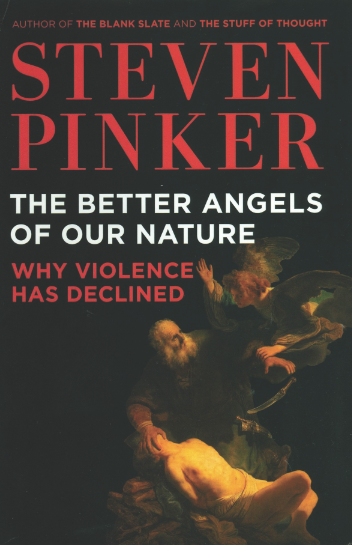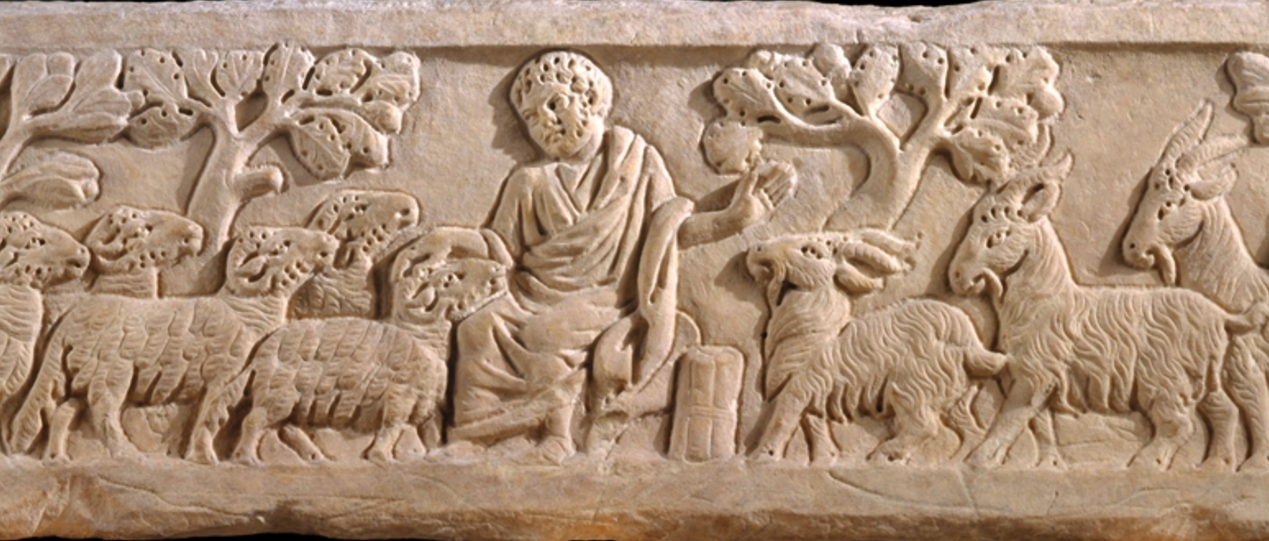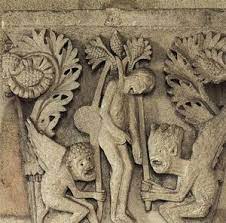
A leading "Miss Temple" of our time is Steven Pinker. I bring him up because in the past one year, two MDs have commended him to me, one even presenting me with an expensive book.

We know the words. They are our words, cherished pictures in the family album:
|
"For I was hungry and you gave Me food;
I was thirsty and you gave Me drink; I was a stranger and you took Me in; I was naked and you clothed Me; I was sick and you visited Me; I was in prison and you came to Me." (Mt 25:35-36) |
So well known have these words become that they are frequently said with one word and one number: "Matthew 25" — a name hanging over the front door of many outreach ministries throughout the world.
They are the reason many people have become, or continue to be, Christian. In the West, they are what remains when the love of God and devout life are stripped off from Christianity. Indeed, they have become a religion unto itself.
During the late 1980s I had not fully acccepted this. I was still projecting my naïve desires onto my Church. The awakening came when God called me away from worldly life and my profession and eventually, I discovered, to the priesthood. It was then, moving from the outside (though praying in a pew every morning) to the inside, when I discovered that my priest, who was second-in-command after the bishop, was an atheist. Years later, long after the bishop's retirement, I read in the New Yorker magazine that he had never believed in God at any stage in his sequence of vows: not at his adult baptism and confirmation, nor his ordination as a deacon, nor his ordination as a priest, not at his consecration as bishop.
As I became better educated, I discovered that this pattern was not unknown. In fact, it was widespread during the late seventeenth and eighteenth centuries with the approach of the so-called Enlightenment. Sr. Mary Margaret Alacoque, as one example, sought closeness with God but was placed by her family in something new: a progressive religious order that sought to emphasize ethics over God. At the same time, she was also overwhelmed by an encounter with the Risen Christ, Who became something of a Spiritual Director to her, even as her superiors and other sisters scoffed at such things.
This era, with its rationalist sensibilities, would give rise to the question we all heard as children: "Isn't it enough to be good? Don't all good people go to Heaven?"
How ironic, in my case! By answering my call to the priesthood — sacrificing my longtime career and large salary — I found my unwelcome in the same parish church where I had been warmly welcomed as a parishioner. Being devout made me an outsider among men who privately mocked devout people. Also ironic was the swiftness with which I was entrusted with serious responsibilities: as hospital lay chaplain, as pastoral visitor, even as occasional preacher.
But, as I would soon come to see, entrusted was the wrong word. These men simply wanted to harness my energy. They were embarrassed to be priests. They saw themselves as intellectuals, leaders in the cause for social justice. But the priest part? That was difficult for them. The pastor of my church would roll his eyes in the sacristy as we were about to begin Mass "What can we do?!" he would sigh. "It is time once again for the hocus-pocus," mocking the Latin phrase "Hoc Est Corpus Meum," which signifies the high point of the Canon of the Mass. He mocked the consecrated gifts as the "magic cookies."
I recall when a famous priest visited our church for a retreat Sunday. He also was a second-in-command, in his case, to a bishop whose books appeared on the New York Times Best-seller List. People came from all over, and our large church was packed. At the climax of his homily, he threw the Holy Bible in a trash can, appealing to his audience, "If Abraham is the father of our faith, then how can we worship a God who orders fathers to kill sons?" I sat in the sanctuary and thought, How could any priest, much less a leader of the national Church, be so Scripturally illiterate? Perhaps he felt that the Scriptures were beneath him and rarely studied them.
Meantime, my own priest was determined to "evangelize" me. One Sunday morning at coffee hour, seeing two girls running toward their seated grandmother, he grabbed my arm. As the three embraced, he said, "There! There is God!" I replied (irritating him) that this certainly was family love, and certainly God is love, but I do not follow the logic that our elevated emotions are on equal ground with God's mysterious and cosmic gift of self-sacrifice, which we call agápe.
The moment of reckoning, of course, would come, for my pastor and I were implacably opposed. I recalled Agatha Christie's 1971 novel Nemesis. The protagonist, Miss Marple, was having tea with someone she had just met: a famous school headmistress and "dame" of the British Empire, ironically named "Miss Temple."
During their polite conversation, Miss Temple described a former student whom she called, "a shining girl .... There was something in her nature."
"Perhaps it was goodness," Miss Marple suggested.
"Oh!," Miss Temple replied with a note of distaste. "Do you believe in such things?"
"Oh, yes ... yes," Miss Marple said. "I believe in evil, in everlasting life, and, oh, yes, goodness ... yes."
The Miss Temples of the world were the bane of C.S. Lewis, who was Agatha Christie's contemporary. He would ask, How can you call yourself progressive when you have taken the wrong turn and are now going down the wrong road and keep getting more and more lost refusing to turn back? ("Case for Christianity," BBC Broadcast Talks, 1942, paraphrase).
The "wrong road," which we have discerned in Miss Temple's thinking, is the premise that our nature is the sum and total of morals and ethics. The idea that good and evil are externals, real things, pointing to the greatest External and Reality, Which is God, is dismissed as superstition.

A leading "Miss Temple" of our time
is Steven Pinker.
I bring him up because in the past one year,
two MDs have commended
him to me,
one even presenting me with an expensive book.
Pinker has been an atheist since age 13 and never turned back. He represents a category in the minds of most educated people today. According to Pinker, all moral subjects begin and end within the human sphere. His recent book, The Better Angels of Our Nature (2011), address Miss Temple's category head-on. Pinker looks out on a world, which people of faith see as being fatally gored by man's claims to authority, and pronounces a rosy picture. He points out that we are kinder towards animals, that we have banished torture and capital punishment, that we have elevated homosexuality to a moral norm, even compelling elementary school children to decide whether they are homosexual. His critics ask, has he never heard of India or China and other Buddhist and Hindu cultures that have been kind to animals for thousands of years? Has he never heard of Africa, where internecine warfare and torture are very much alive? But I am getting off the subject....
My point is that Pinker has become a kind of Arius of our day. He is a brilliant and audacious culture idol, who has charmed the bees, has entranced the minds of the majority, and has invaded the Western Church like a monarch. And who has not noticed the drift toward ethical culture in the Western Churches, even to the point when the Pope in Rome has called the Angelus, the Lord's Prayer, and the traditional Mass into question?
I asked my atheist pastor to consider a practical challenge that he certainly would face: "You will not get a man up on a cold, winter Sunday morning when he can sleep in, to shovel the walk and driveway, to brush the snow off the car, to start a fire in the wood stove, to rouse his wife and children out of bed, to dress them, and then pile everyone into the car for something that is not very different from the United Way."
At this point in my story, many will wonder, "What Church is this, anyway?" And I reply, "It does not really matter." I have encountered these same priests and religious in both the Anglican and Roman Communions. It is a Western phenomenon. For the Western Catholic Churches, and mainstream Protestantism, by and large, have fabricated their own "God." This "God" is indefatigable in his patience and understanding; is unpleasantly surprised at the cruel, man-made invention of "sin"; sees everyone as being "wonderful"; and always grants every kind of nonviolent lifestyle permission (except permission to criticize progressivism). This is a key to understanding the social movement represented by Miss Temple and Steven Pinker: that sin is nothing more than a mean-spirited construct invented by frustrated men who want to control everyone.
Coming of age during the 1960s and '70s, we heard the message pounded out on many pulpits: "Real faith is action." But that has become a dated message. No one disagreed with it from the start. Far from it! And now the question has shifted: "With real action how does faith fit in? Isn't it enough to be a good person?"
Permit me to return to my atheist pastor, whose role in my life included spiritual direction. He told me in one of our private meetings, "I notice you have given up many things: smoking, drinking, television, R-rated movies. I direct you now to give up one more thing."
"What is it?" I asked.
"I advise you to give up giving up things. And I advise you to contemplate the sensuality of dogs."
The pastor had several dogs whom he admired for their lack of inhibition. He wanted me to get in touch with my "inner animal," to eradicate my "up-tightness." Of course, once you have dispensed with God, the inevitable question becomes, "Why shouldn't I act on my bodily impulses, so long as I am a "good" person?"
Indeed, in my own diocese a priest was deposed for going one step further, which was addressing the bodily needs of his elderly parishioners personally. He was not penitent but boldly demanded, "Isn't this what Christianity is all about? Taking care of one other, sharing the warmth of love, and banishing loneliness?" In his mind he was fulfilling the injunction voiced in Matthew 25. And no doubt he sincerely believed that the Son of Man and all His angels would congratulate him for his ministry of warmth. You see, he was a new and different level from the rest of us. .... But should I say "the rest of us"? For surely those who are not on this wavelenght have shrunk to a very small minority.
We do not have to wait for the Second Coming to see if this priest is right. Our own souls will report God's answer. For the further we journey toward the fabricated idol falsely named God, the sooner we discover that our hearts and souls have begun to die within us.
This slow death begins with depression. Next comes insomnia. In desperation the "condition" is treated with alcohol, opioids, benzodiazepines, or more illicit sex, which produces deeper depression .... especially as incurable venereal diseases appear. Unbidden questions arise from within: "What is happening? How did I get here? What is this merry-go-round?"
A shining priest I met when I was a university chaplain has spent his entire career in this same vocation. He tells me of the students who come to him complaining of depression. He asks, "Do you pray?"
They reply, "Well, Father .... you see, I used to pray ...."
"Pray!" he tells them. "Do not become preoccupied with depression when you are not even praying!"
"What is the rest of the story with these students?" I asked him.
"They reconnect with God, and in most cases," he told me, "their depression disappears."
You know, I do know people of faith who love God who do not sleep well at night. Not one.
As an aside this morning, I add that Major Depression or Bipolar Disorder are not always spiritual or moral phenomena. They can arise from organic illness. Recent research points to head trauma as an etiology (as it is for so many things). But the great majority of sadnesses people struggle with most certainly are spiritual phenomena. They are inextricably tied to a spiritual phenomenon known as alienation, to be precise, the three-fold alienation.
It begins with alienation from God, as soon as we break off from godly life. It is not subtle. Our spiritual temperature is altered. Desolation becomes palpable.
Why have God and His angels departed? We think of the Psalmist: "Take not from me Thy Holy Spirit?" Or of the blessing falling off of King Saul, which he could never again regain. Why has God departed?
God and His angels are holy. They are exquisitely sensitive to an unholy interior. They cannot breathe the toxic atmosphere of an ungodly world, no more than we could stroll through a landfill pumping out methane gas through safety vents. They are sensitive in the same way that all of us once were ..... before we permitted callouses to grow over our hearts, before our ears dulled, no longer hearing the alarms of conscience. Do you remember how loud they were when we took our first steps in the wrong direction?
Once God has departed, everything changes. Our relationships with others also change. For person-to-person intimacy is rooted in intimacy with God. When purity and goodness vanish, we become strangers to each other. Where once we knew absolute trust and loyalty and tenderness, distrust, infidelity, and indifference creep in. To press on through this landscape of alienation, we must become callous. Soon, we find that we live in a cloud of ambiguity and ambivalence, where all reference points are lost. No one really holds anything in common, for all have made their own rules, have fabricated their own truths, and are ruled by their own egos with, inevitably, an endless train of impulse and empty desire and self-flattery which are the marks of "ego life." The inevitable follow-on, of course, is emptiness, fear, and insecurity .... and, yes, depresssion and insomnia. All of this constitutes the second alienation: alienation from one other.

And now we are alone.
We are where we thought we wanted to be:
living out our own truths,
having everything our way,
freely indulging our perceived "needs,"
isolated from the judgment of others.
And a heavy weight bears down upon us.
It is a crushing weight,
yet
somehow it emanates from our inmost centers.
We go to the doctor, who tells us we are suffering from depression. Here are some pills. But they do not work. They do not bring back the lightness of being we once knew. They do not restore the brightness of a clear, sunny morning with its freshness and immediacy. They do not erase the dark cave that has become our core and center. And here we have arrived to the third alienation, which is alienation from oneself.
Here is end. This is where Dr. Faustus, who has traded away godly life in order to have his every desire, asks the demon Mephistopheles, "At least tell me this: where is Hell?" And the demon replies, "Why this is Hell, nor are we out of it" (Philip Marlowe (Dr. Fautus).
Is service real faith? Is action? Beyond all debate, our good works are essences of Divine life: God's action amongst us (Jas 2:14-26).
A fact that is often lost in discussions of Matthew 25 is that to feed and clothe and care for those less fortunate is, mysteriously, to care for God:
|
"Assuredly, I say to you, inasmuch as you did it to one of
the least of these My brethren, you did it to Me." (Mt 25:40) |
Good works are the natural manifestation of a loving and caring heart, a heart that is ever-new and tender and, yes, sensitive. If callouses had ever obscured its pink color, they now have split off and fallen away as relationship with God is restored. I can here it in the laughter of those who have restored to God. For, to remember a proverb, the good are always the merry.
Without God, the heart and all its merriness die. Only from God can we ever truly have life. And only in God can we ever truly be free. For
|
To know you, O Lord, is eternal life.
And to serve you is perfect freedom. (The Collect for Peace) |
The servitude which is perfect freedom. A paradox? What sort of freedom is this, anyway? The Psalmist says,
| Taste, and you will see. (Ps 34:8) |
Certainly, we have tasted and seen the alternative. In this we learn a lesson: God is the Creator; we are His creatures. God has made everything that is good, and we fail when we try to reduplicate this Creation. We fail even to define the good .... as the free-for-all in our unraveling world attests.
What is the good? It is closeness to God. The Lord Jesus tells us that God alone is good (Mk 10:18). The nearer to God, the greater the goodness. He is goodness itself:
| Taste and see. Taste and see the Goodness of the Lord. |